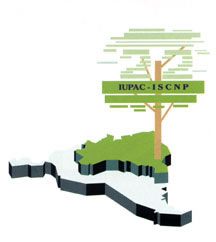22nd IUPAC International Symposium on the Chemistry of Natural
Products (ISCNP-22), 4-8 September 2000, São Carlos, São
Paulo, Brazil
> Back to Calendar
 Symposium
website
Symposium
website
 Research
on the chemistry of natural products has a long tradition. The topic
can be regarded as the basis of modern organic and biomolecular
chemistry. It is not surprising that IUPAC, at an early stage of
its activities, initiated the present series of biennial symposia,
which now has been going on for nearly half a century. Organic natural
products have been a major source of inspiration not only for present
activities in organic chemistry, but also for activities in related
fields of life sciences. Today we experience exciting development
of molecular understanding of functions of natural organic compounds
in life processes, and we can enjoy and be fascinated by the enormous
diversity that nature offers.
Research
on the chemistry of natural products has a long tradition. The topic
can be regarded as the basis of modern organic and biomolecular
chemistry. It is not surprising that IUPAC, at an early stage of
its activities, initiated the present series of biennial symposia,
which now has been going on for nearly half a century. Organic natural
products have been a major source of inspiration not only for present
activities in organic chemistry, but also for activities in related
fields of life sciences. Today we experience exciting development
of molecular understanding of functions of natural organic compounds
in life processes, and we can enjoy and be fascinated by the enormous
diversity that nature offers.
The development of methods for synthesis, separation techniques,
and structural studies, has provided tools for studies of natural
products. These studies offer a deeper understanding of the chemistry
of life processes and of complex biological and ecological interactions
in nature.
The recent ISCNP-22 symposium in Brazil clearly demonstrated the
importance of interdisciplinary research efforts in the field. It
gave an overview and provided excellent opportunities for exchange
of information and for starting collaborative research efforts.
Scientific quality of the presentations was high, and the scientific
program provided an outlook on several research frontiers from synthesis
and biosynthesis to mode of action. During the 5 symposium days,
8 plenary lectures, 19 invited lectures, and 33 short lectures were
presented. Each morning there were poster sessions; more than 300
posters were presented in all. Particularly impressive were the
contributions from the many young, mainly Brazilian, scientists.
Enthusiasm and interest for research and development in the field,
demonstrated by the Brazilian scientists, were significant and strongly
indicate future successful activities of high international quality.
Prof. Dr. Otto R. Gottlieb, who was chairman of the symposium organizing
committee, can be very proud, because he is the mentor for many
of the natural product chemists of Brazil.
The initiative of having this symposium in a developing country
and, in particular, in a biodiversity-rich country such as Brazil,
was very much appreciated. The symposium will not only have an impact
for the future development of this field of research in Brazil,
but will also provide a platform for activities in other biodiversity-rich
countries. The organizers–and, in particular, Prof. Dr. M.
Fátima das G. F. da Silva, who was the Secretary General–are
to be congratulated for a successful symposium.
Prof. Torbjörn Norin
President, IUPAC Organic and Biomolecular
Chemistry Division III
Royal Institute of Technology
Stockholm, Sweden
> Published in Chem.
Int. 23(3), 2001

